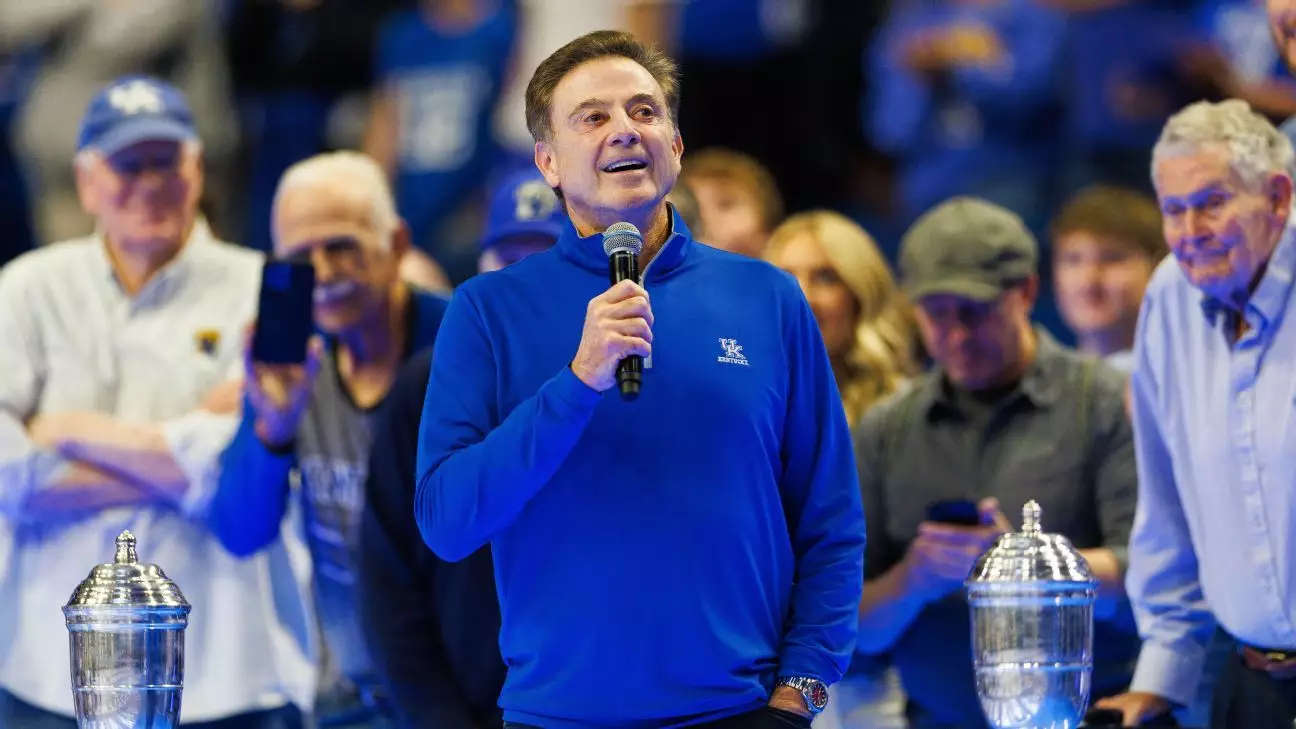Rick Pitino’s recent appearance at Kentucky’s Big Blue Madness event marks a significant chapter in both his personal and professional life, having returned to a program that he once led to national glory. Nearly three decades after securing the NCAA championship in 1996, Pitino, now at the helm of St. John’s, was met with an overwhelmingly warm reception in an arena that once echoed with the cheers of his victories. Adorned in a Kentucky sweater, Pitino stood at the heart of Rupp Arena, his eyes glistening with emotion and nostalgia. This seemingly idyllic reunion was long awaited, especially after an intricate tapestry of triumphs and tumult that defined his career.
This event is particularly poignant given the complicated history Pitino shares with Kentucky fans. Having experienced the electrifying highs of winning a championship, Pitino’s post-Kentucky journey was fraught with challenges, particularly during his time with the Boston Celtics, which ended in disappointment. His controversial decision to coach at Louisville—a fierce rival—only added fuel to an already simmering fire of animosity among Kentucky supporters. Still, stepping onto the court at Rupp Arena as an icon felt like coming home for Pitino, underscoring the emotional undertones associated with both his upbringing in the sport and the memories that still linger in the hallowed halls of Kentucky basketball.
Pitino’s tumultuous journey of rivalry and redemption is a testament to the complexities of sports relationships. Upon accepting the Louisville position in 2001, he was acutely aware of the backlash that would follow. His decision not only alienated him from the Kentucky faithful but also placed him in the crosshairs of fervent rivalry sentiments. Perfectly capturing the intense emotions involved, Pitino characterized the Kentucky-Louisville rivalry as one steeped in “pure hatred,” particularly during high-stakes matchups, including their pivotal 2012 Final Four clash.
However, as years passed, a shift began to unfold. With Mark Pope’s hiring as head coach of Kentucky in March, former tensions softened. Pitino’s previous mentorship of Pope became a talking point, highlighting the connections that continue to bind Kentucky basketball. In his impassioned speech during the Big Blue Madness celebration, Pitino embraced this narrative, professing his faith in Pope to elevate Kentucky to new heights in the upcoming seasons.
As Pitino took to the microphone, the atmosphere was charged with a mixture of nostalgia and hope. “I am so happy to be back,” he proclaimed, needing a moment to collect himself as cheers erupted around him. Here was a man who once faced scorn but was now warmly embraced by fans who eagerly recounted the glory days of championship basketball. Regardless of past grievances, there was a sense of unity in recognizing the greatness that Pitino once brought to the program. His heartfelt reminiscences were interwoven with gratitude for the players that shaped his tenure, as well as the loyal fanbase that supported him throughout.
This reunion also throws into relief the era of coaching turbulence at Kentucky in recent years—marked by two consecutive first-round exits in the NCAA tournament. The stakes for Pope are high, but Pitino’s support carries immense weight. By endorsing Pope in front of a raucous crowd, Pitino not only reaffirmed Pope’s position but also indicated a return to a lineage of excellence long associated with Kentucky basketball.
Pitino’s return was not merely a nostalgic trip but rather a rite of passage that symbolizes the evolution of Kentucky’s basketball narrative. Through the complex layers of rivalry and personal history, it also represents the potential for healing and a renewed commitment to the standards of excellence that defines the program.
As the curtain rises on a new season, Pitino’s visit serves as both a reminder of the past and a beacon of hope for the future—an illustration that, in the fast-paced world of college sports, reconciliation is possible and, in many ways, essential. The once-divided fanbase may find common ground in their shared love for the game and the quest for greatness.

Leave a Reply